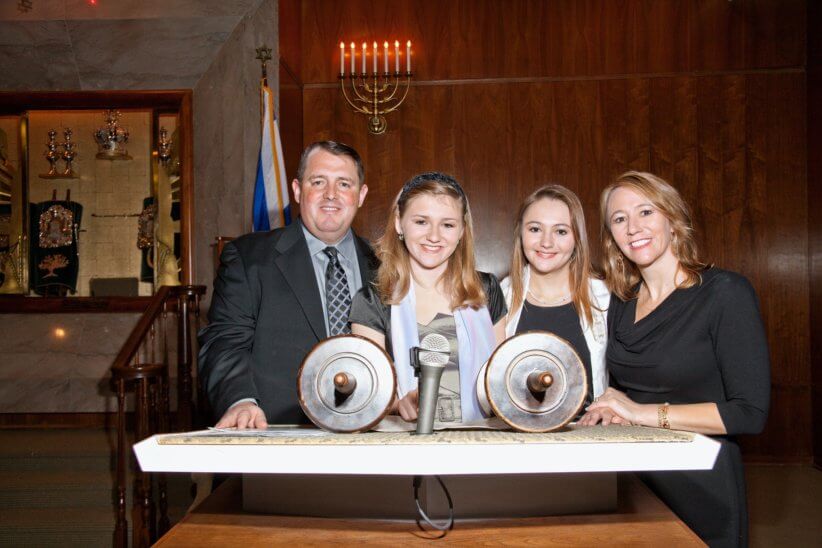
Families are looking for ways to make their celebration meaningful.
Bedazzled sneakers, swanky swag for the kids, signature cocktails for the adults – today’s modern b’nai mitzvah in the 914 are a far cry from the celebrations of our parent’s generation. While the party may have many details, it is easy to lose sight of the fact that what comes before the party, the bar or bat mitzvah, is both a religious ceremony and a rite of passage that should be imbued with significance. We spoke with three local clergy members who offer advice on how to make this special moment in time more meaningful for families.
Focus On the Process
Rabbi Jonathan Jaffe, the Senior Rabbi at Temple Beth El of Northern Westchester in Chappaqua, a Reform synagogue, believes that all too often families tend to equate Jewish education with b’nai mitzvah preparation. “It can be viewed as a teach to the test model with the ceremony being viewed as a one-off event and the graduation taking place with that child’s time on the bimah that day. It is a dangerous model,” warns Jaffe. “I am less interested in what happens with the student on the bimah and more interested in the long-term meaning from the process (which takes on average a year to prepare for) and how that student emerges through the process,” says Jaffe.
Rabbi Stacy Bergman is an independent rabbi unaffiliated with a synagogue who conducts roughly 30 to 35 b’nai mitzvah ceremonies a year throughout the tri-state area. She also places a strong emphasis on the process. When she meets with families initially she explains, “This is a moment in time where I want the kids to work hard enough to feel they have accomplished something and that they deserve to be celebrated. I want them to look back on the experience and somehow feel transformed.”
At Conservative Temple Shaarei Tikvah in Scarsdale led by Rabbi Adam Baldachin, each family meets with him at least four times during the process which he calls a “journey” and those families have monthly b’nai mitzvah workshops where they have deeper conversations about what it means to be a bar/bat mitzvah and what that means for that child’s Jewish identity. “I want the students to think what does it mean to be a Jewish adult within the larger context of community?”
The Communal Aspect of the Ceremony
For anyone who has ever attended a bar/bat mitzvah ceremony, it is easy to observe that this is also a communal celebration. “This is a moment where the community comes together to support the child and help that child emerge to be the leader they can be. The ceremony is also an opportunity to see the child in a different light for school friends, adds Baldachin.
Rabbi Jaffe hopes that the bar/bat mitzvah child learns to feel comfortable within a synagogue environment and consider the synagogue community as their home. As students prepare for their ceremony, he asks them to think about how this process will be useful in their lives going forward.
“I ask them on the day of your ceremony when you are leading the congregation in Hebrew and reading from the Torah, what do you think is happening at a synagogue in France? I want them to understand that they are engaging in a global celebration of Jewish identity that transcends not just time but also space. The foundational blocks of the Jewish people are learned through the b’nai mitzvah process so that if that same student studies abroad in Madrid during college and enters a synagogue, they will feel comfortable and welcome in that space and be treated like family instead of a tourist.”
All of the rabbis interviewed emphasized how important it was for them to develop a personal relationship with the bar/bat mitzvah child and their family. Bergman said the many meetings she holds with the families prior to the big day help her understand family dynamics. “I am thoughtful as to how we should include those family members in the service whether they say a blessing at the service or pass the Torah to many generations of the family present during the ceremony. I think of ways to personalize each service.”
Looking at the Bigger Picture
“There is an ancient phrase that I use often during this process that essentially says out of pain comes reward,” explains Baldachin. His synagogue offers a lot of support so that the child’s anxiety and stress is minimized. “We want the child to see that when they are committed to something and they put in the effort to something that seems unattainable, it is actually achievable.”
“I like to couch the bar/bat mitzvah as an opening ritual or springboard to guide the child through adolescence, a formative time in the child’s life. The bar/bat mitzvah ceremony will push them out of their comfort zone but also teach them about their own strength and build confidence. It is a moment to say we love you, we believe in you, we are thrilled for you – you are not alone. There is an entire community and world that values you,” sums up Jaffe.










